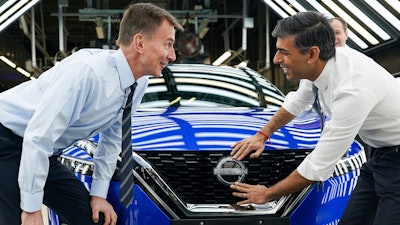
LONDON (AP) — Nissan will invest $1.4 billion to update its factory in northeast England to make electric versions of its two best-selling cars, a boost for the British government as it tries to revive the country's ailing economy.
The Japanese automaker manufactures the gasoline or gas-hybrid Qashqai and smaller Juke crossover vehicles at the factory in Sunderland, which employs 6,000 workers.
Nissan Motor Co. said it's directly investing up to 1.12 billion pounds ($1.4 billion) to produce electric successors to the two models. The money also will enable "wider investment in infrastructure projects and the supply chain, including a new gigafactory" for EV batteries at the site, the government said in a separate press release.
"Nissan's investment is a massive vote of confidence in the U.K.'s automotive industry," which contributes 71 billion pounds a year to the economy, Prime Minister Rishi Sunak said.
Sunak visited the factory for the announcement, posing for photos with Treasury chief Jeremy Hunt in front of a blue Qashqai on the assembly line, meeting workers and getting a tour from plant staff. The day before, Hunt announced tax cuts and other budget priorities ahead of a national election next year, coming as economic growth is weak in the U.K. and still-high inflation is squeezing consumers.
The Qashqai is the U.K.'s second most popular vehicle this year, while the Juke is the seventh. Nissan also said it will make the next generation of its long-running Leaf electric car at the factory.
The company said in 2021 that it planned to build an electric vehicle at the factory, alongside batteries made next door by supplier AESC, owned by China's Envision. AESC already has two gigafactories in Sunderland, and Friday's announcement adds a third.
EVs are "at the heart of our plans to achieve carbon neutrality," Nissan President and CEO Makoto Uchida said in a statement. "With electric versions of our core European models on the way, we are accelerating towards a new era for Nissan, for industry and for our customers."
Nissan has set a target of electrifying its entire European passenger car lineup by 2030.
"With today's announcement, we are making that vision happen," Uchida said at the plant, which temporarily stopped production for the ceremony.
The future of Nissan's Sunderland had been in question before and after Britain's 2016 vote to leave the European Union. Brexit opponents said leaving the bloc without a trade deal would damage Britain's economy because companies like Nissan would face tariffs on exports to the EU.
The auto industry is bracing for 10% post-Brexit trade tariffs taking effect in January. They threaten to raise the cost of new EVs by punishing manufacturers in their respective markets for not sourcing enough of their components from either the EU or Britain.
Many EV makers will struggle to meet the requirement because Europe lags behind Asia in battery production. Nissan, however, is the only carmaker in the U.K. with a dedicated battery plant nearby.
Nissan joins other automakers making the transition to EV production in the U.K., even as Sunak pushed back a deadline to end the sale of new gas and diesel cars by five years, to 2035.
BMW said earlier this year that it's investing 600 million pounds into its Mini factory in Oxford, England, to start making electric vehicles by 2026.
India's Tata Sons, which owns Jaguar Land Rover, is building a 4 billion-pound EV battery factory in the U.K. that's expected to produce about 40 gigawatt hours of battery cells every year, enough to provide half the U.K.'s electric vehicle batteries.
Stellantis, parent company of British automaker Vauxhall, is investing 100 million pounds to make electric vans and cars in northwestern England.






















